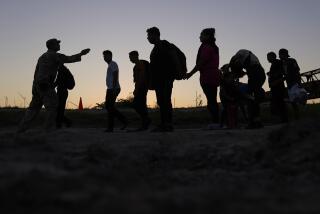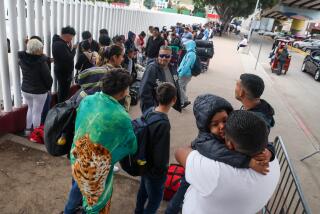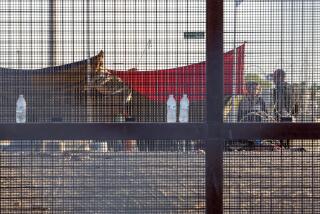Homeland security chief visits Texas border
Capping a Friday tour of Texas immigration detention and shelter facilities crowded with young migrants, Homeland Security Secretary Jeh Johnson and administration officials released new numbers detailing the scope of the influx and announced plans to house immigrants in a new 700-bed detention facility in New Mexico.
More than 52,000 unaccompanied youths have been caught along the Southwest border this fiscal year, almost double last year’s total.
A greater share of the children are from Central America, including more than twice as many Hondurans and nearly twice as many Salvadorans. Meanwhile, the number of unaccompanied children caught crossing from Mexico fell by about a third.
The influx of migrants has shifted to Texas from Arizona, where the Tucson sector saw 4% fewer unaccompanied children caught this fiscal year.
The epicenter of the crisis is the Rio Grande Valley, where more than 37,000 were caught this year, nearly triple last year’s total.
On Friday, the Homeland Security chief visited and spoke with officials as well as children held at a Border Patrol station in McAllen, Texas, and a newly opened shelter for unaccompanied immigrant youths at Joint Base Lackland-San Antonio.
“Their stories are a vivid reminder that the issue we face is as much a humanitarian one as it is a matter of border security,” Johnson said.
He said an increase of federal resources to the border has allowed the department to process more children and families, but acknowledged that they have yet to stem the tide of illegal migration across the Southwestern border.
“We are exploring every lawful option to stem the tide and, with the combined efforts of multiple components of our government, the support of Congress, and our partnerships with our allies in Mexico and Central America, I believe we will,” he said.
Officials have blamed the influx in part on rumors circulated in Central America and bolstered by smugglers that parents and children who cross illegally will be given permisos, or approval to stay legally. In fact, they are given notices to appear and plead their case in immigration court, where they may still be deported.
U.S. officials are working with counterparts in the region to alert parents that it’s not worth the risk to cross, Johnson said.
“We are sending the message, in Spanish and English, to parents about the dangers of entrusting your child to a criminal smuggling organization to bring them on the long journey to the U.S.”
More to Read
Sign up for Essential California
The most important California stories and recommendations in your inbox every morning.
You may occasionally receive promotional content from the Los Angeles Times.











